Bloggforum 3: Ben Hammersley on our responsibility as bloggers + podcast & vlog
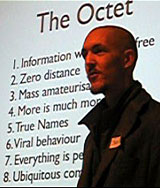 One of the most interesting people at Bloggforum 3 was Ben Hammersley, who talked about the responsibility we, as bloggers, have for shaping the future. Going back through history some 5 000 years, he showed us how civilizations have risen and fallen, how people have re-invented the wheel, invented new technology etc only to fall back into the mud and live in huts.
One of the most interesting people at Bloggforum 3 was Ben Hammersley, who talked about the responsibility we, as bloggers, have for shaping the future. Going back through history some 5 000 years, he showed us how civilizations have risen and fallen, how people have re-invented the wheel, invented new technology etc only to fall back into the mud and live in huts.
Ben Hammersley thinks that we are at a breaking point right now, and that we have an opportunity to break that circle and evolve. Having said that, and having listed eight points that he believes are the ideas that are changing society, and why they are fought by the “men in suits” – the people in power – he pointed out the responsibility that we, as bloggers, have for shaping the future.
What he said felt very urgent, and so I have transcribed some of it, but I really recommend that you listen to the whole seminar.
Here is a podcast of the seminar. It’s 1 hour 8 minutes long and the mp3 file is 64MB.
…and here is a video clip of the final minute. (There you also find out the new name of this blog :) )
Here’s my transcription of parts of it, published with kind permission from Ben Hammersley. It’s a long post, I know, but bare with it.
“Technology builds on itself. When you’ve got faster chips, this enables you to design even faster chips.”
“But as we’ve said, technology usually dies.”
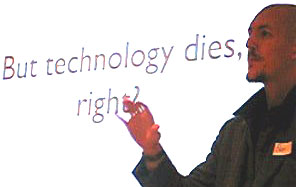
“Consider the concept that this stuff isn’t actually going to go away. This is probably the most terrifying thought that bloggers can say aloud. Blogging isn’t like skateboarding or yo-yos… it isn’t a craze, it’s a symptom of a new type of technology, and this new type of technology isn’t going to go away, so everything that you’ve talked about today and everything we talk about online all the time, for example the death of the music industry, … or the re-invention of social networks, or anything like that, these aren’t things that are like products that are going to be around for the next three or four years, and then people’ll get tired of them and then they’ll go away and we can have our old music industry back.
This has fundamentally changed society. Forever. Now, the fact that only we in this room know it really doesn’t make any difference. The first fligth that .. Wright made was watched by four people and a dog. History changed that morning. The fact that four people and a dog were the only people to see it really doesn’t make any difference.
Because of this, human society has reached a decision point. We’re sitting on the top of the hill with our snowboard on and an enormous drop below us. And we’re suddenly going ‘This looks really good. But I might die! Oh no, I can’t.’
Society is sitting here, ready to drop in, and there are lots of things holding people back. Technology is pushing, pushing, pushing, ready to push us over the edge. Technological process will continue, because the technological process that we’ve had before pushes on the new technology.
I’ve got to buy a new laptop, and I’m gonna use that new laptop in order to develop new products, which will mean that all of my friends are going to have to buy new laptops in about a year’s time. All the laptop designers are using machines to develop faster laptops which will mean that they’ll be able to use those machines to develop even faster laptops. Stuff builds upon itslef. So the technological process will continue.
To hold it back is a social thing, a political thing.”
“We’re coming to a big change in society. These are the eight big ideas that I think are really going to make a big difference.”
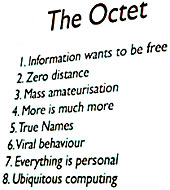
“To the vast majority of people, especially for those people who are in power, whether it’s political power or business power, these are really terrifying things.
First of all, Information wants to be free.”
No matter what you believe about the copyright argument, this is a big change in society.”
“Zero distance. I live in Italy but I work in London, electronically. I have friends all around the world. It makes no difference now where we are in the world. This is a huge transformation. A hundred years ago if you wanted to get a message from Stockholm to London it would take a few days. 500 years ago it would take weeks. Now if you want to get a message across from Stockholm to London you log on to Skype, instant messaging or email and it takes microseconds.
This starts to raise questions about countries’ borders, and what it actually means to live in a country. What are the responsibilities of a nation state, etc.
If the whole point of where you live defines who you are as a person, and you spend most of your time in World of Warcraft, shouldn’t you have a World of Warcraft passport and not a Swedish passport? I know a lot of people who spend more energy building things in say World of Warcraft than they do in the actual country that they’re actually sat in. So what rights and responsibilities do they have in their online worlds and their offline worlds. These are societal issues that might sound really really stupid now, but in ten years time, twenty years time, these are going to be big big issues.
Mass amateurization, that is what we are, in this room. There used to be an old saying in America, that the freedom of the press belongs to those who own the presses. We all own the presses now.”
This is a change that has only happened in the last few years, and people haven’t got their head around it yet, the difference this is going to make”
“More is much more basically means that when you have lots of people together that means that they produce lots more than if you put them all separately.”
True names. The fact that we can now both prove our identity online, and we can also be perfectly anonymous online. And what does anonymity mean when we’re talking about everything else.
For example, if I was to start a newspaper 50 years ago, and I wanted to publish a paper in London, I’d have to have a printing press in London, so there was no such thing as zero business. I had to own a printing press. So that means that information wasn’t free – I’d have to be someone who was able to own a printing press. I couldn’t be an amateur because I had to do it for a living and I had to buy all this stuff. It wouldn’t really help me if I had five million people working in my printing press because they’d all get in eachothers’ way. And I couldn’t do it anonymously, because in order to have a printing press people would have to know who I was. Whereas now, three or four years into the blogging revolution, I can reach more people with an anonymous website than any newspaper in the world.
Now this is all still very new, so not much has happened with that yet, but over the next few years, but we are going to start to consider what it means to society in general. What does it mean that I can completely anonymously go online and say anything I want to anybody in the world. This has never happened before in the history of civilization, so it’s a really big issue. And we’re right there at the tipping point, about whether or not we are going to do it or not.
The other three are completely irrelevant.”
“These are the big ideas that really freak the men in suits out. These really scare people. Because every single one of these ideas, even the things that the people in this room are sitting thinking ‘well, we do that all the time anyway’…
We’re really scary.”
“In Tunis, this week, at the W6 meeting, the world summit on information society, which was this big UN sponsored meeting with all the leaders of the world talking about the internet… and the first thing that happened on the Monday was that a blogger was beaten up in the press office by the Tunisian police. Why was he beaten up? Well, because he was taking pictures and posting them to Flickr.
Now, the irony of the world summit on information society not only being in a country where they actually censor the internet but also taking people who weren’t licenced journalists and beating them up because they were being journalists just kind of shows that the average person in a suit, wherever they are in the world, hasn’t quite got the grasp of these truths, these things are happening right now. Because they’ve only been happening for the past few years, but they’re happening in an ever-increasing rate, accelerating, accelerating, accelerating.
And so because of this, the guys in suits have brought out the opposition. These are the anti-ideas that are coming up.

We’ve got a huge copyright issue going on. In almost every country in the world there are laws trying to be introduced which will prevent people from doing everything that they want to do online.”
“Zero distance. Becuase we’re capable of working anywhere in the world, communicating instantly with anywhere in the world, the borders are being locked down. It’s much more difficult to travel now than it was three years ago. Yes, this has got to do with terrorism, but really, it’s not terrorism, it’s to do with the whole thing. The fact that it’s very very simple for us to move ourselves to new places and set up work there. Companies can move their it operations for example from America to India in one day. There are laws being ___ in the American senate that will prevent American companies from doing that legally. Because it’s freaking people out that you can take a banking operation in Florida and move it to Sri Lanka by pressing a button. This is scaring people.
Mass amateurization. There are huge censorship laws coming in. Political blogs in America are starting to be looked up by the federal election control commission because in the next year it’s the senate election, and they’re starting to say ‘hang on a second, are political blogs in America journalists or are they fund-raising activities for the candidates. And if they are newspapers then they have certain rights and responsibilities, and if they are fundraising activities then they have also other laws, which means that we can shut them down. We can stop people from saying what they want.’
Now, P2P networks are being blocked everywhere. Skype is being blocked by lots of ISPs. Instant messaging is being blocked.”
“Blogging isn’t one of the ideas, but it embodies all of them. It’s kind of the future in its purest form.”
“It means that, by doing what you’re doing, whether you’re writing about politics, whether you’re writing about socks, whether you’re posting pictures of your cat, whether you’re writing long essays about philosophy or whether or not you’re saying how much you hate your teacher, it really doesn’t matter. What you’re doing when you blog is actually breaking civilization as we know it. We’re kind of ruining people’s society.
In one sense we’re really lucky bastards. We’re the people on day one of a huge social revolution. Being in the technology world right now with the internet and blogging and all that sort of stuff sort of seems to me like being Michaelangelo’s neighbour on the first day of the renaissance. It’s kind of like being drinking-buddies with William Shakespeare. We might not necesarily be the engineers, or the developers or the entrepreneurs or whatever, who are pushing this stuff on, but in our own little way we are right here, right on the cutting edge.”
“We’re right there, on this birth of a whole new society, the birth of a whole new idea. Now of course, we’re also completely unlucky bastards. Because with these massive changes in society, as we’re sitting there, doing our thing, posting our story about our cat, exercising all this new technology that we’ve got, we have a responsibility. We have an opportunity here to take this new technology, to take these new ideas, to take these widely but fundamentally good things – it’s a fundamentally good thing that anybody who wants to say anything to anybody in the world can say it, it’s a fundamentally good thing that if you’ve got an idea you can put it on the web and in 30 seconds, right now, spread your ideas around, it’s a fundamentally good thing that you can read everybody else’s stuff …
What makes us such unlucky bastards is that what we do now – literally now, this week, this month, this year, the next 500 days – will change how human society evolves over the next 1000 years. That may be always true, but we are right now on a tipping point, we are right now at that moment where we can either run with it, we can do all these things that are really cool and we can take all the bad stuff that comes with it and we can deal with that as well. Or we can sort of give up, and we can allow the guys in suits to shut it down, we can allow Sony to take over our PCs, we can allow the Tunisian government to be the host of the summit on information society and censor the meeting, we can allow the government to close us down, we can allow laws to be passed which say we can’t do this stuff anymore.
To finish up, the point that I’m trying to bring across here, is that civilization right now is at this point where we can go one of either way, one of two ways. There, to me, is a good way, which is embodied by everybody in this room. And there’s a bad way which is embodied by all the people who don’t like all the people in this room. And we have to, in the next year or so, fight for our way. Go out there, join the EFF, support the creative commons, do all that stuff. But more than anything, keep on doing what you’re doing. Do more of it. Because what you’re doing right now is shaping the way that the world is going to be for your kids and for me when I’m an old person. And, being completely selfish, I really want to live in a world which is shaped by you guys. I don’t want to live in a world which is shaped by the guys in suits. So, to kind of finish – keep doing it. We’ve got a really good opportunity here to make something really special for the whole world. And.. let’s not fuck it up.”
Update 20061126: I changed the vlog link to YouTube
Archived comments from my old publishing system:
Raymond from Oslo, Norway writes:
This was a Great entry! Thank you very very much for taking the time to transcribe all that. Immensely useful, not just for the next few days but also something for the future. Raymond
M-o-m: 5 – 2005-11-23 15:53



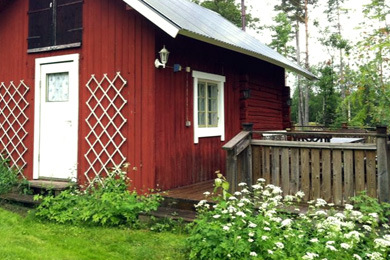

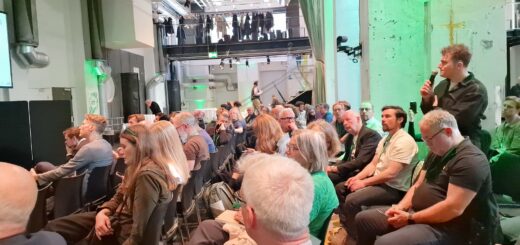
2 Responses
[…] The declaration is directed to “the American congress and other public officials”. But it’s not only the US that they are concerned about. Universal Affordable Access is at the top of the list of demands. The other items on the list are An Open and Neutral Network and World Class Quality through Competition. Upon reading this, the words of photographer and writer Ben Hammersley ring in my ears, from when he listed his octet of things that will fundamentally change society in the 21st century (back at Bloggforum 3.0 in November 2005 – the book will be published this October). “To hold it (the development – my remark) back is a social thing, a political thing.” So is the Congress going to listen? Aren’t they the “men in suits” that Hammersley talks about… These are the big ideas that really freak the men in suits out. These really scare people. Because every single one of these ideas, even the things that the people in this room are sitting thinking ‘well, we do that all the time anyway’… We’re really scary. […]
[…] are An Open and Neutral Network and World Class Quality through Competition. Upon reading this, the words of photographer and writer Ben Hammersley ring in my ears, from when he listed his octet of things that will fundamentally change society in […]